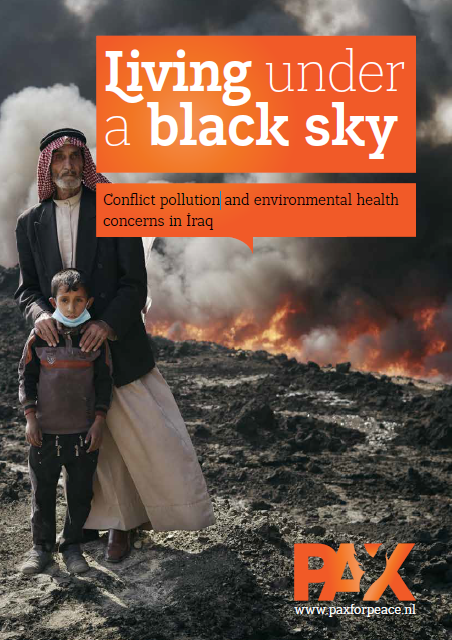A new PAX report reveals how the conflict in Iraq has left a toxic trail of destruction which could have severe health consequences for Iraqis and could complicate reconstruction efforts.
‘Living under a black sky’ shows how months of burning oil wells created a blackened landscape, while in other places large oil spills have polluted farmland and rivers. The report also identifies a sharp increase of hazardous makeshift oil refining, with more than 1600 small refineries at 20 locations in northern Iraq.
The research includes a survey among Iraqi civilians living in Qayyarah, an oil town near Mosul where oil wells were deliberately set on fire by retreating ISIS fighters. Some of the wells burned for more than eight months. Locals are anxious about their health and well-being after living under the noxious clouds that left nothing untouched: the air, the soil, drinking water and water for agriculture, and livestock. They call for rapid clean-up of the oil pollution and for support for health monitoring.
“Our findings demonstrate the need to provide sustained support to communities affected by toxic remnants of war, and to take these concerns seriously. Environmental health risks are too often underestimated and overlooked in humanitarian work and reconstruction, yet have the potential to create acute and chronic health risks to civilians,” said Wim Zwijnenburg, project leader at PAX and author of the report.
Widespread damage
For the last three years, PAX has monitored the ongoing fighting in Iraq using open-source methods, and through contact with local partners, UN institutions and humanitarian organisations, to collect data on potential environmental hotspots. The findings of the report demonstrate the wide-ranging toxic consequences of conflict for the environment and for the health of civilians, as well as the hinderances it causes duringreconstruction efforts. Widespread damage to urban areas, including Mosul, generated millions of tons of rubble often mixed with hazardous materials. In addition, the fighting targeted critical infrastructure such as powerplants and sewage systems, the absence of which in turn can have detrimental environmental health risks.
More support needed
Attacks by the Islamic State on oil facilities around Kirkuk and Baiji also resulted in many oil spills in the Tigris river, and oil spills flowing over large swathes of agricultural land. Local farmers say this damage makes it hard if not impossible to earn a living. PAX calls for increased data collection, sharing and monitoring to improve humanitarian response towards these toxic remnants of war. States and relevant international organisations should support the Iraqi government and local communities with financial support and expertise to mitigate and minimize environmental health risks.
“The environment is often the silent victim in any conflict, but we know that long-term recovery and peacebuilding is also dependent on taking clear action on repairing environmental damage. The environment needs to be put front and centre of reconstruction efforts,” said Erik Solheim, head of UN Environment.
UN conference in Nairobi
The report was presented at the UN Environmental Assembly (UNEA) in Nairobi, where UN member states are discussing a new resolution on conflict pollution prevention in areas affected by armed conflict. A strong resolution can support the call from affected states to the international community to provide the necessary assistance and expertise for dealing with conflict pollution. PAX, as part of the Toxic Remnants of War Network, is contributing to the discussions at UNEA.
Doug Weir, Coordinator of the Toxic Remnants of War Network, and present at the UNEA negotiations: “The conflict in Iraq, and other regional conflicts, has shown that serious conflict pollution can be caused by non-state actors, as well as by states. UNEA should be an opportunity for the international community to bring forward clear commitments to address the toxic remnants of war, and encourage UN Environment to enhance its work in this area.”
Downloaded Living under a black sky
For more information see also the work of one of the report’s authors for the Bellingcat open-source research collective




